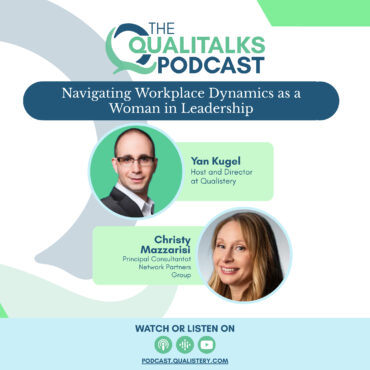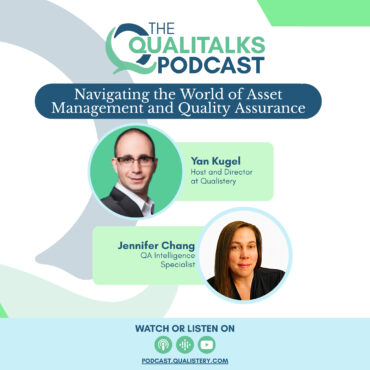
Things That Have to Change in GMP to Drive Success
In this podcast, our guest is Jerry Chapman, a GMP expert with more than 40 years in the industry. Jerry and Yan talk about what has changed in pharma over […]
 play_arrow
play_arrow
Agility in Pharma: Transforming Challenges into Opportunities [Elizabeth Hickman] Elizabeth Hickman
 play_arrow
play_arrow
Navigating Workplace Dynamics as a Woman in Leadership [Christy Mazzarisi] Christy Mazzarisi

The first part of the talk: Things That Have to Change in GMP to Drive Success
In this podcast, Yan Kugel and our guest Jerry Chapman talk about how the landscape has changed over the years in the Pharma industry and what things have remained the same. This is the second part of their talk, where they discuss technological advancement in the pharmaceutical industry, what holds us back, and where we are headed.
Table of Contents
Currently working as Senior GMP Quality Expert at Redica Systems, Jerry has invaluable experience in the quality domain and implementation of international GMP regulations in quality policies. With experience spanning 40 years, he is helping to develop coursework on manufacturing deviation investigations and teaching the course to enable the personnel to conduct and properly document investigations.
This episode is Sponsored by Dot Compliance, the industry’s first ready to use Quality Management Solution powered by the SalesForce platform. Implementation of a new eQMS has never been quicker nor easier.
Learn More About Dot Compliance
FDA has also come in to introduce advanced manufacturing technologies to various companies. Efforts are underway to help companies adopt these new developments. But the problem lies in the ‘post-approval changes.’
Sometimes it happens that you discover a chance you could make in your manufacturing process that would radically make a product cost-effective. But it would take years to implement that change because regulatory approvals would take so much time before they can be implemented. A different period in each country required for the regulatory approval translates into other product manufacturing methods. And over time, it becomes pretty challenging to keep track of all of it.
Recently the work has been underway on changing regulations to make the adoption of advanced technologies smoother and upgrade the manufacturing process efficiently.
ICH Q12 reduces the cost and time burden on the industry. It ensures continuous improvement by introducing tools that help in implementing post-approval changes. This improvement is still in its early phase, but it is promising.
Companies often blame their inability to adopt new technologies on FDA regulations, but this is a lazy attitude. Although it’s challenging to make the post-approval changes, FDA has teams to help companies implement these new changes. People from both parties sit down and work up a plan to introduce the changes. So the FDA is playing quite a facilitating role in that respect.
There’s also a complacent attitude on the part of companies that disapprove of these new developments. They want to keep the status quo intact and don’t explore the possibilities.
Another problem is that quality personnel face difficulty conveying the cost of ensuring the quality of the product to the management teams. So the proactive approach to avoid problems becomes even more complicated when faced with this problem.
The quality personnel needs to be trained in this respect to assess the cost of changes required to alleviate a particular problem and communicate it to the higher management.
The quality personnel also feel difficulty in justifying the need to use new and better tools. Because companies are too skeptical about the cost, they don’t feel the need to change things. But they need to understand how the new technologies are going to make their operation more efficient and bring more profit.
Information on good manufacturing practices (GMP) in the life science industry is scattered, vague and poorly organized. We have chosen to solve this problem by organizing the best possible GMP webinars and courses to ensure we deliver all the information you need in a concise, engaging and clear format. All events are free and open to anyone in the industry.
Browse Upcoming Free GMP Webinars
With technological advancements happening in every walk of life, there’s a growing need to incorporate these developments into the pharma industry. We are using software that is more than 20 years old. There are also new technologies that automate processes that needed human resources in the past.
The FDR regulations are written very broadly, and they are subject to a lot of interpretation. Companies face difficulty finding out what it is that is expected of them. One way to solve this problem is to look at enforcement actions by the FDA and investigate what things should be changed or improved if you want to avoid a warning letter or a 483.
In the past, an expert would sit down with a highlighter and point out the things that FDA focused on the regulations and the hidden problems that FDA didn’t mention too clearly but are potentially problematic. A lot of companies are still doing it that way. Redica Systems developed a computer algorithm using natural language processing and artificial intelligence tools that produces the same kind of analysis in an automated process that an expert would make. This saves a considerable amount of time and human resources. That is just an example of how new developments in technology are revolutionizing the pharma industry.
There has been a significant proliferation of different regulatory agencies worldwide and have a more nuanced approach that can help your company attain the highest standard of quality. The automation of these procedures is also helping in forming an international market because it improves our communication and provides an exchange of ideas with each other.
It would be much easier if software could tell how difficult a change in manufacturing could be. Or how it would impact a specific molecule in the process of product development. Or what steps to take to avoid regulatory restrictions. Given human check and balance at various points, the technology will radically change the whole process. And for the better too. That is the goal of future developments in the pharma industry.
Go to the first part of their talk: Things That Have to Change in GMP to Drive Success
[simple-author-box]
[mailerlite_form form_id=1]
Tagged as: New Technology in GMP, yan, jerry chapman.
Jerry Chapman is Senior GMP Quality Expert at Redica Systems. He brings over 40 years’ experience in the pharma industry, including 31 years at Eli Lilly, where he worked in product development, biosynthetic human insulin manufacturing, and site and corporate quality. He designed and implemented a comprehensive GMP Intelligence process to identify, analyze, and archive pertinent drug GMP regulations, inspection findings, trends, and best practices in the U.S. and internationally. Chapman was founder and chairman of the GMP Intelligence subgroup of the Midwest Discussion Group from 2005 to 2010. He was Senior Editor at International Pharmaceutical Quality for six years; Editor-in-Chief for Xavier Health; has been an invited speaker at PDA, AAPS, ISPE, and RAPS events; and has served as a consultant to the animal health and compounding pharmacy industries. At Redica Systems, Chapman works with the machine learning and data science teams building computer models that examine enforcement actions and other data and produce analyses the way an expert would in the past using hard copy documents and a highlighter. His articles detailing and analyzing current hot topics among the pharma industry and international regulators appear on the Redica Systems Conference Spotlight page.

Jerry Chapman October 20, 2021
In this podcast, our guest is Jerry Chapman, a GMP expert with more than 40 years in the industry. Jerry and Yan talk about what has changed in pharma over […]


Copyright © 2023 Qualistery